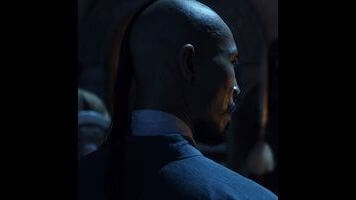The first sign that “Hashshahin” is going to be something different is the fact that there’s a cold open. It’s stunning, a perfectly-executed extension of last episode’s muddled climax. We open on Hundred Eyes wandering outside, his ears picking up on sounds that are clearly out of place at this time of night. Soon, we learn that there are three assassins who have come to execute Kublai Khan with a poison dart. He’s shot while with Marco, and the assassins invade the room. Soon, Byamba and a handful of guards storm the room and dispense of the assassins, leaving one alive for interrogation. It’s the first moment of real consequence since the final battle between Kublai Khan and Ariq back in the second episode, and it kickstarts the narrative. Suddenly, there’s a sense of urgency to the story that‘s been completely absent, and it strengthens the surrounding storylines.
With the Khan on his death bed, barely clinging to life, Prince Jingim must take over command. Retaliation would seem to be the most logical course of action, but it’s not that simple. Hundred Eyes informs Jingim that the attackers were not part of the Song dynasty, but rather Hashshashin, hired assassins trained by a mysterious old man in the mountains. Seeking an answer to who hired the assassins, Marco devises a plan to pose as a merchant and infiltrate a town where the Hashshashin are known to live. Jingim sends Marco along with Byamba to investigate, and the ensuing journey is beautifully paced and loaded with stakes for every character. The storyline brings many of the internal conflicts, which up to this point have been astonishingly ignored, to the surface. Jingim is eager to prove his worth as the Khan’s heir, while also battling an insecurity he has in terms of how his father views him. Marco is doing much of the same, attempting to discover himself, to find out whether or not he can let go of the man who has abandoned him and potentially integrate with the Mongolians. Ahmad, the Minister of Finance, pushes Jingim towards war for reasons that we’ll touch on in a bit. Even Byamba,the Khan’s bastard who has yet to see much screen time, is eager to please, to rise above his bastard status. Marco Polo has spent far too much time this season establishing an exploitative and overbearing aesthetic, but it’s almost worth it when we get an episode like this, where the motivations behind every character interaction is clear and the story is moving forward at a significant pace.
If there’s a problem with Marco and Byamba’s journey, it’s the cringeworthy orgy scene. After getting high on opium, Marco hallucinates an orgy, shot in kaleidoscopic fashion (because he’s high. Get it?) and tinged red. Not only is the scene overly long, it’s completely unnecessary. I’m sure that the writers could have pulled out just about anything else to let us know that Marco was high; instead, they resort to another problematic orientalist fantasy, resulting in one of the few regrettable moments in an otherwise strong episode.
Back at Kublai Khan’s court, Empress Chabi continues to play an important part in the empire’s decision-making, even if she doesn’t boast any official power. Chabi is sneakily one of the show’s best characters, and Joan Chen is doing remarkable work as a loyal but opinionated mother and Queen. Watching her move from giving words of encouragement to Jingim in his time of emotional need to showing a vulnerability towards Kublai Khan, embracing his ailing body, shows the wonderful depth and complexity of Chabi.
When Marco and Byamba return from their journey, they reveal to the now-healed Khan that the assassins must have been hired by someone within his court, as the assassins were provided with a detailed map of his chambers. Marco says he recognizes the handwriting, and that it belongs to someone already dead. But he’s not ready to reveal who it is before he confirms his suspicions. The idea of a traitor working within the court of Kublai Khan, and Marco being privy to his or her identity, injects this season with a welcome narrative twist. It’s the first significant cliffhanger the show has given us thus far, and for the first time this season, I was eager to do exactly what Netflix always hopes you will: click through to the next episode.
Stray observations:
- Sidao has now been given control of Xiangyang’s army. I’m sure he’ll be a reasonable and just leader.
- While meeting with the old man in the mountains, Marco mentions that the assassins would have to “kill us,” referring to himself and Kublai Khan’s people. It’s significant in that he now identifies with the empire, a point driven home in the episode’s final scene.
- That final scene is wonderfully shot. Even though we know it’s Marco who’s branding his father and uncle as thieves, letting the camera linger away from his face, only revealing it as the scene ends, adds a nice bit of visual tension to a scene that has personal implications for Marco.
- Fathers looming large over their sons is the connective tissue of this episode. The shadow of Genghis Khan encompasses Kublai, who in turn encompasses Jingim. Niccolò Polo’s reputation as a great adventurer achieves the same effect in regards to Marco.
- So Marco says that the man who drew the map is already dead, but that can’t be true, can it? Ahmad seems like the most obvious suspect, as he spends the episode pushing for war, and did everything he could in the previous episode to sabotage the parley.
- For once, in the scene where Marco attempts to deal with the traders and be led to the old man in the mountains, Lorenzo Richelmy shows some charisma.
- Hundred Eyes is so much cooler when he’s not talking.














![HBO teases new Euphoria, Larry David, and much more in 2026 sizzle reel [Updated]](https://img.pastemagazine.com/wp-content/avuploads/2025/12/12100344/MixCollage-12-Dec-2025-09-56-AM-9137.jpg)


























